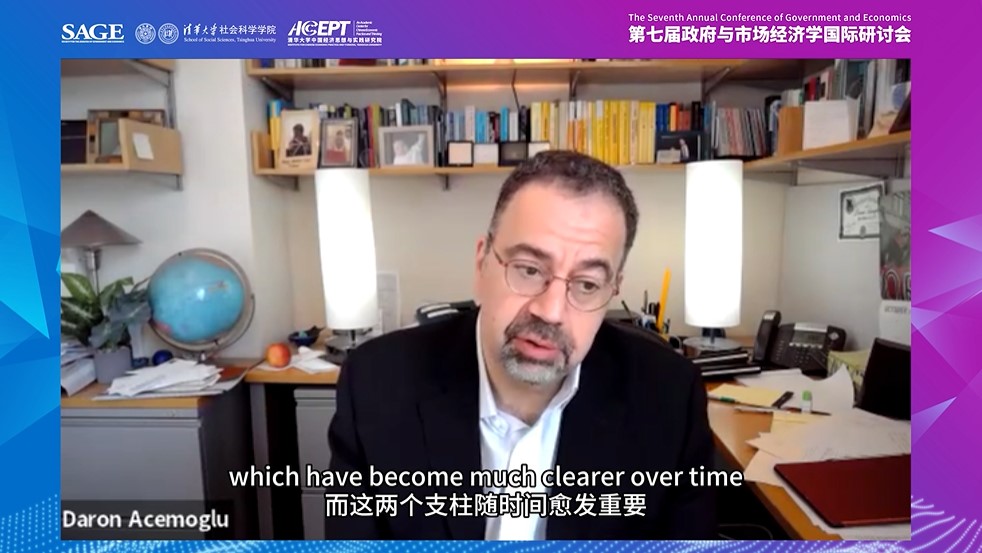
The following is a summary of Daron Acemoglu's keynote address to attendees at the Seventh Annual Conference of Government and Economics held at Tsinghua University, Beijing, on June 7, 2025. Dr. Acemoglu is a 2024 Nobel Laureate in Economics and Professor of Economics at the Massachusetts Institute of Technology.
On June 10, 2025, the Seventh Annual Conference of Government and Economics, co-hosted by the Society for the Analysis of Government and Economics (SAGE) along with Tsinghua University's School of Social Sciences and the Academic Center for Chinese Economic Practice and Thinking (ACCEPT), was broadcasted online. Daron Acemoglu, who is a 2024 Nobel Laureate in Economic Sciences and Professor of Economics at the Massachusetts Institute of Technology, delivered a keynote address to attendees at the conference in a video presentation.
Acemoglu's keynote speech concentrated on the significance and motivations of government agencies in the modern market economy. He first pointed out that government agencies represent a key "fourth pillar" for modern-day state governance above and beyond the traditional division of powers into three separate branches of government. At the present moment, the US government has shown itself to be at risk from increasing politicization, threatening the independence and impartiality of government institutions, which has therefore sparked serious concerns. Meanwhile, Elon Musk's Department of Government Efficiency (DOGE) has made significant budget cuts to the Department of Education, the National Institutes of Health and other agencies under the US federal government, inflicting heavy damage to the foundations underpinning the country's ability to innovate. DOGE has blundered in its ideological attacks, undermining institutional stability and the once strong sense of mission at government agencies, triggering a mass exodus of skilled professionals and undermining the government's long-term effectiveness.
As for the incentive mechanisms driving the behavior of government agencies and their staff members, Acemoglu suggested that such public institutions need not make use of powerful economic incentives, but instead should focus on recruiting the right personnel while at the same time remaining devoted to one clearly defined sense of mission, avoiding the confusion associated with pursuing a multiplicity of competing goals as stipulated by the Tinbergen Rule. He further argued that the main purpose of government reforms should be to direct greater attention towards important areas that require more regulation, such as the regulation of artificial intelligence, while at the same time doing away with ineffective regulations, such as licensing requirements and onerous approval processes. In lieu of burdensome regulatory procedures, carbon taxes and subsidies for instance can be used to address the climate change problem, which can in turn free up the vitality of the private sector. Moreover, the question of whether to increase or decrease the budgets of government agencies is not the core issue, with the main focal point instead centering around how best to make improvements to existing regulatory frameworks.
In reference to the US fiscal deficit, Acemoglu concluded that merely undertaking reforms to the country's Department of the Treasury alone would not solve the problem. The root cause of the deficit can instead be traced to the malfunctioning political system that has resulted from increased polarization between the two political parties, resulting in low public trust and the poor functioning of democratic institutions, with this situation therefore having created an urgent need for fundamental democratic reforms. As to the proposition of potentially reforming the Department of the Treasury, he does not consider following the example of the US Federal Reserve model or preset contractual arrangements on fiscal spending to be viable. Given that fiscal spending is determined based on a dynamic process of political decision-making, a degree of flexibility is required in order to respond to any unforeseen events as they arise, with rigid rules otherwise constraining the government's capacity to respond effectively.
At present, state and local governments in the US lack the appropriate incentives to stimulate local economic development. Acemoglu argued that a part of the problem is due to an over-reliance on transfer payments from the federal government, which weakens the fiscal autonomy and initiative of state and local governments. Even more notably, under the system of "fiscal federalism" in the US, states are often caught up in a race to the bottom or conversely err in imposing excessive regulatory burdens, all of which has seriously hampered the efficiency of government programs and policies.